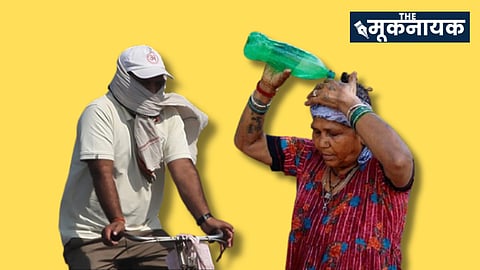
New Delhi: In the scorching summer heat, sanitation workers in the national capital grapple with formidable challenges, which impact their well-being and livelihoods. Engaged in a range of demanding tasks across urban areas, from clearing sewers to maintaining public toilets, these workers endure physically taxing labor under harsh environmental conditions, heightening their susceptibility to heat-related ailments.
With an estimated workforce of around 5 million spread across India, these informal laborers face a host of issues including job insecurity, erratic incomes, and the absence of formal employment agreements. Their vulnerability is further exacerbated by the lack of social safety nets, leaving them perilously exposed to both financial instability and the escalating impacts of climate change.
Projections outlined in the IPCC Fifth Assessment Report paint a troubling picture, foreseeing a drastic surge in the frequency and duration of heatwaves by the century's end, particularly under scenarios of warming temperatures. For South Asian regions like Delhi, where outdoor work is commonplace, these forecasts signal an alarming future. With temperatures anticipated to soar by 4-5°C by 2080 under high-emission scenarios, the plight of these workers only grows more dire.
In 2022, India grappled with a staggering 203 days marked by scorching heatwaves, a record high in recent memory. Reports from the Indian Meteorological Department (IMD) and the Ministry of Earth Sciences (MoES) reveal that Delhi bore the brunt with approximately 17 heatwave days, a stark contrast to the mere 3 recorded in 2021.
Adding to the grim scenario, the International Labour Organization (ILO) projects a looming threat to India's workforce, anticipating a potential 5.8% reduction in overall labor hours by 2030 due to escalating heat and humidity levels.
This decline in labor productivity poses formidable challenges for India, particularly given that roughly 90% of its workforce operates within the informal sector, many of whom are engaged in physically demanding roles.
Despite the gravity of these forecasts and the evident strain on the workforce, the plight of these workers remains largely overlooked, with both employers and governmental bodies failing to address their pressing concerns.
Susheel Chandel, general secretary of the Delhi Jal Board Sewer Department Mazdoor Sangathan, lamented the lack of support for sanitation workers, emphasizing that neither the government nor any other entity provides assistance. He highlighted the prevalent use of contractual employment, leaving workers devoid of essential services besides their irregularly disbursed wages.
He underscored the absence of health insurance, leaving sanitation workers vulnerable in times of illness, forcing them to cover medical expenses from their own pockets. Despite their service to the Delhi Jal Board, he alleged a dearth of provisions to mitigate the harsh working conditions, prompting workers to pool resources to purchase a cooler for relief from the sweltering heat.
Addressing government directives, he noted the prohibition on labor during peak heat hours, enforced by the union to ensure workers' return by noon. However, irregular payment exacerbates their predicament, with wages often delayed.
While some benefit from initiatives like paid leave mandated by Delhi Lieutenant Governor VK Saxena for construction workers during extreme heat, not all sanitation workers receive such respite. Ashok Kumar from the Dalit Adivasi Shakti Adhikar Manch recounted witnessing sanitation workers laboring through scorching temperatures despite government orders.
He noted, "The ongoing cleaning of open drains along Mundka Road by the Public Works Department (PWD) continues. Despite this effort, daily complaints persist, requiring constant attention from the workers."
"Dismissals of laborers by contractors, spurred by strikes and overdue payments, have escalated, intensifying the workload for those still employed. Consequently, many find it challenging to observe the mandated break from 12:00 PM to 3:00 PM."
Heat Exposure Doubles the Risk of Miscarriages
According to the National Campaign on Dalit Human Rights (NCDHR), women make up 50% of sanitation workers in urban areas, while in rural India, women exclusively undertake manual scavenging of human excreta.
A study conducted in Tamil Nadu, published in October 2023, revealed significant findings concerning the impact of occupational exposure to extreme heat on pregnant women.
The research indicates that such exposure more than doubles the risk of miscarriage and generally heightens the overall risk of adverse pregnancy and birth outcomes.
Vidhya Venugopal, the corresponding author of the study and a professor at the Faculty of Public Health at the Sri Ramachandra Institute of Higher Education and Research in Chennai, provided additional insights to PTI.
Venugopal highlighted that limited access to toilets led to reduced intake of food and fluids among women, resulting in malnutrition, which further impacted pregnancy outcomes.
The study, which examined a cohort of 800 pregnant women, found that 47% of them worked outdoors and were exposed to extreme heat.
Among these women, the study revealed that 6.1% experienced stillbirths and preterm births, a stark contrast to the 2.6% among those exposed to heat within safe limits.
Furthermore, the study pointed out that 8.4% of women exposed to high heat levels gave birth to babies with low birth weight, compared to 4.5% of those exposed to safe heat levels.
Published in the British Journal of Obstetrics and Gynaecology, this groundbreaking study marks the first of its kind conducted in India.
You can also join our WhatsApp group to get premium and selected news of The Mooknayak on WhatsApp. Click here to join the WhatsApp group.